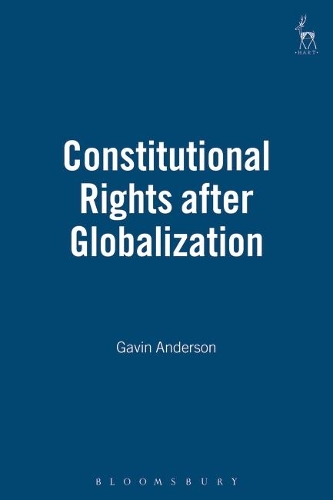
Constitutional Rights after Globalization
(Hardback)
Publishing Details
Constitutional Rights after Globalization
By (Author) Gavin Anderson
Bloomsbury Publishing PLC
Hart Publishing
11th May 2005
United Kingdom
Classifications
Tertiary Education
Non Fiction
Constitution: government and the state
342.02
Physical Properties
Hardback
176
Width 156mm, Height 234mm, Spine 14mm
Description
Unthinking Constitutional Law juxtaposes the globalisation of the economy and the worldwide spread of constitutional charters of rights. The shift of political authority to powerful economic actors entailed by neo-liberal globalisation challenges the traditional state-centred focus of constitutional law. Contemporary debate has responded to this challenge in normative terms, whether by reinterpreting rights or redirecting their ends, e.g. to reach private actors. However, globalisation undermines the liberal legalist epistemology on which these approaches rest, by positing the existence of multiple sites of legal production, (e.g. multinational corporations) beyond the state. This dynamic, between globalisation and legal pluralism on one side, and rights constitutionalism on the other, provides the context for addressing the question of rights constitutionalism's counterhegemonic potential. This shows first that the interpretive and instrumental assumptions underlying constitutional adjudication are empirically suspect: constitutional law tends more to disorder than coherence, and frequently is an ineffective tool for social change. Instead, legal pluralism contends that constitutionalism's importance lies in symbolic terms as a legitimating discourse. The competing liberal and 'new' politics of definition (the latter highlighting how neo-liberal values and institutions constrain political action) are contrasted to show how each advances different agenda. A comparative survey of constitutionalism's engagement with private power shows that conceiving of constitutions in the predominant liberal mode has broadly favoured hegemonic interests. It is concluded that counterhegemonic forms of constitutional discourse cannot be effected within, but only by unthinking, the dominant liberal legalist paradigm, in a manner that takes seriously all exercises of political power.
Reviews
The evidence Anderson marshals in favour of legal pluralism over legal liberalism is compelling. -- Caroline Libman Mandell * University of Toronto Law Journal, Vol. 56 No. 3 *
...an excellent piece of scholarship and deserves praise. It tackles head-on a theme of enormous momentthe consequences of globalisation for constitutional lawand it is anything but parochial, developing clear lines of argument on the basis of wide-ranging, interdisciplinary research. -- Thomas Poole * Public Law *
a convincing critique -- Hans Lindahl * Social and Legal Studies, Volume 16(1) *
Anderson successfully meets the challenge of discussing a potentially dry subject...by making his arguments mercifully brief, yet surprisingly clear -- Julie A. Thomas * Law & Politics Book Review, Vol 16, No 2 *
Author Bio
Gavin W Anderson is Senior Lecturer in the School of Law, University of Glasgow.
